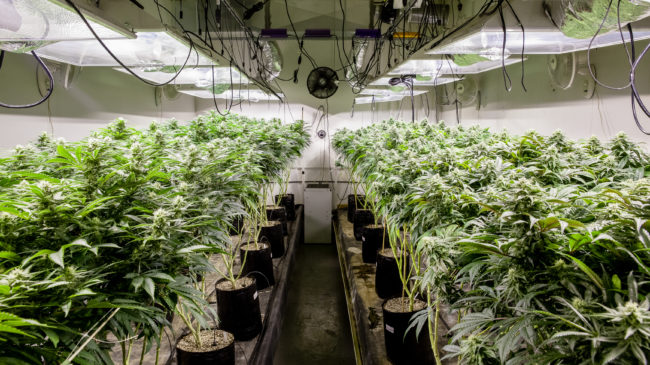New Jersey Public Question 1: Marijuana Legalization
Summary:
Question 1 would amend the New Jersey State Constitution to legalize the adult use of marijuana effective January 1, 2021. The provisions in the amendment are limited. Marijuana would only be legal for those over the age of 21. Cultivating, processing and retail sales of marijuana would also be legal. The Cannabis Regulatory Commission, which oversees New Jersey’s medical marijuana program, would also regulate the cultivation, processing, and sale of recreational marijuana. The state sales tax of 6.625 percent would apply to recreational marijuana sales, and local governments may put in place their own sales taxes on recreational marijuana up to an additional 2 percent.
Fiscal Impact:
There is no official statement on the fiscal impact to the state. One industry estimate is that the New Jersey recreational marijuana market would be about $850 million, so if all of that were taxable revenues at the state sales tax rate established by Question 1, the state would receive approximately $56 million in new sales tax revenue. However, there would likely be some modest new costs for licensing, enforcement, etc., and likely significant savings on cost for arresting, trying, and incarcerating people for marijuana offenses as well.
Proponents’ Arguments For:
Proponents of Question 1 argue that each year 37,000 people are arrested in New Jersey for cannabis, mostly for simple possession. But those laws are not equally applied and even though black people and white people use cannabis at about the same rate, black people are arrested at a rate 3.5 times higher than white people. That means massive costs from the stigma and humiliation that can go with an arrest, the additional financial burden of bail and legal costs, and the hours lost in school or work time—all which fall disproportionately on communities of color.
A simple possession conviction can lead to prison time, hefty fines and fees, driver’s license suspension, immigration consequences, loss of financial aid for school, family consequences including a ban from adoption and loss of custody, and a ban from public housing. Supporters say Question 1 would mitigate and eliminate these consequences and would reduce the criminal and civil penalties that disrupt lives. It would also significantly reduce unnecessary interactions with police that so often escalate and lead to bad outcomes. Question 1 would end the hundreds of millions of dollars per year New Jersey spends on policing, arresting, prosecuting, and punishing people for minor cannabis-related offenses. It would lead to a new cannabis industry that would create thousands of legal jobs throughout the state.
Opponents Arguments against:
Opponents say New Jersey residents don’t want pot shops in their back yards and that creating a for-profit pot industry in New Jersey would create all the wrong incentives, allowing a predatory industry to further harm minority communities in New Jersey. They argue that some studies shows legalizing pot will put the public safety of New Jerseyans at risk. Question 1 would ignore historical trends of harmful youth usage and the extensive negative effect legalized marijuana has had on communities of color. Legalization will mean marijuana will be more available to underage users—in Colorado legalizing weed led to a 6 percent increase in youth marijuana use. And it will be a mess for employers dealing with employees who use marijuana.
Discussion:
Question 1 is a simple amendment to the state constitution that would legalize adult-use of recreational marijuana. The proposal leaves most of the details of how that will work up to the state legislature and the Cannabis Regulatory Commission. Because putting detailed regulations into the state constitution would make the rules very difficult to change as the world changes, this is a smart move. One clear lesson from states that have legalized recreational marijuana is that the rules must evolve and adapt to fit the particulars of the state market and related laws.
For voters, New Jersey’s Question 1 mostly comes down to what they broadly think about legalizing marijuana. Adult recreational use of marijuana is currently legal in 12 states, and more and more people seem to be persuaded it is a good idea. National polling by Pew Research Center shows 67 percent of American adults say marijuana should be legal (including 55 percent of Republicans and Republican leaners), and adults who oppose legalization has fallen from 52 percent in 2010 to 32 percent today. In New Jersey, the numbers are almost identical, with 68 percent supporting legalization in July, up from 61 percent in April.
But many voters are going to want to consider the key arguments by both sides.
The racial disparities of marijuana prohibition and the War on Drugs are well documented. Census data shows that nationwide a higher percentage of white adults use marijuana than black adults, but FBI crime data shows that a black person in the United States is 3.73 times more likely than a white person to be arrested for marijuana possession on average, and will on average receive a 9 percent longer sentence for a similar crime.
Estimates of state revenues for New Jersey from legalization vary widely. The estimate in the fiscal impact section of this guide uses a basic approximation assuming the simplest approach to taxation. Reality can be more complex and states should be conservative in estimating revenues until they have experience and data to rely upon. All states that have legalized have seen considerable state revenues. The states that most heavily regulate and tax the legal market have seen the least reduction in the black market, stunting the growth of the legal market, and generating considerably less state revenue than might have been realized in a more successful legalized market.
The same is certainly true for creating legal marijuana market jobs. Overall job growth in the industry is robust: a 2019 nationwide analysis found 211,000 jobs in the legal cannabis industry, and that workforce increased 21 percent in 2017, another 44 percent in 2018, and anticipated at least another 20 percent growth in jobs in 2019.
Opponents of legalizing marijuana argue that it will impose societal costs like increased emergency room visits, medical care, and addiction treatment for the uninsured; more victims of drugged driving accidents; increased crime; and a negative impact on health from secondhand smoke. These matters bear more examination, but keep in mind that they are all true of black-market marijuana, are almost all true of alcohol, and none of these were reasons why marijuana was made illegal in the first place.
Overall research on states that have legalized medical marijuana or decriminalized marijuana possession and use have seen no increase in juvenile use. And a 2019 study in the Journal of the American Medical Association found that legalizing recreational marijuana use for adults led to an average 8 percent decrease in juvenile use in Oregon and Colorado. Nationwide juvenile use of marijuana has been falling since 2011, the year prior to legalization in the first states to do so—Colorado and Washington.
Studies on the effect of marijuana legalization on traffic accidents are inconclusive as it is hard to isolate the effects due to mixing of use of alcohol and THC, difficult to measure THC impairment, and difficult to separate confounding effects like marijuana use reducing drunk driving.
Even while marijuana is predominantly bought and sold in the black market, without either private and competitive incentives for quality control and safety, or any regulations with the same goal, current data show that marijuana has fewer health risks than either alcohol or tobacco. Legalizing marijuana and ending black markets would likely improve its safety.
Voters’ Guide to Other Marijuana Legalization and Drug Policy 2020 Ballot Initiatives
Voters’ Guides to 2020 Ballot Initiatives on Other Policy Topics



